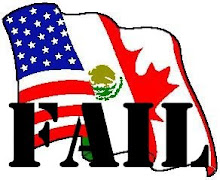The US recently released new regulations for air travel security that has many people angry and upset. You’ve probably heard about the full body scanners that have been installed in airports around North America (I say North America because they exist in Canadian airports for US bound flights). The general idea: they take an x-ray-like picture of you which is reviewed by a central command center offsite to determine if you’re trying to smuggle anything onto the plane.
The images are only clothes deep though, meaning what is seen is a naked image of you…all sides, all appendages, including breasts and genitals.
You don’t have to go through the scanner though. Instead, you can opt for a pat down. So given a choice between being subjected to some level of radiation and someone seeing you naked, some people would rather go for the regular old patdown.
Except its not the regular old pat down anymore. For a real-life account of what the new pat downs involve, check out Jeffrey Goldberg’s article in The Atlantic. Here’s a short outtake though:
At BWI, I told the officer who directed me to the back-scatter that I preferred a pat-down. I did this in order to see how effective the manual search would be. When I made this request, a number of TSA officers, to my surprise, began laughing. I asked why. One of them -- the one who would eventually conduct my pat-down -- said that the rules were changing shortly, and that I would soon understand why the back-scatter was preferable to the manual search. I asked him if the new guidelines included a cavity search.
"No way. You think Congress would allow that?"
I answered, "If you're a terrorist, you're going to hide your weapons in your anus or your vagina." He blushed when I said "vagina."
"Yes, but starting tomorrow, we're going to start searching your crotchal area" -- this is the word he used, "crotchal" -- and you're not going to like it."
"What am I not going to like?" I asked.
"We have to search up your thighs and between your legs until we meet resistance," he explained.
The article goes on to suggest that TSA is making the pat downs so much more uncomfortable than the full body scanners that people will opt for the lesser of the two embarrassments (here’s a link to a follow up article Jeffrey wrote about another experience).
So of course there’s a number of people in the US that are pissed at all of this “security theatre”, to the point that they’ve organized the National Opt Out Day. The goal, from their website, is…
…to send a message to our lawmakers that we demand change. No naked body scanners, no government-approved groping. We have a right to privacy and buying a plane ticket should not mean that we're guilty until proven innocent. This day is needed because many people do not understand what they consent to when choosing to fly.
How do you achieve this goal? By encouraging EVERYONE flying on November 24th (apparently one of the busiest travel days in the US) to opt for the pat down.
Wait…say what?! OPT for the pat down?! Yes…because, the logic goes, the pat down takes way longer to perform than simply stepping into the scanner. The lines would backlog and cause huge delays, making people upset and TSA staff frustrated, and negate the benefits of those scanners.
It’s an interesting tactic and we’ll see how much of an effect this will have on air travel that day, but I suspect that the majority of travellers are focussed on getting to their destination and unfortunately that means that they’ll do whatever is the fastest method of getting through security.
More and more, the train is looking to be a better travel option.




